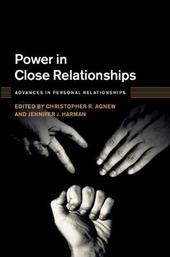
|
Power in Close Relationships
Hardback
Main Details
| Title |
Power in Close Relationships
|
| Authors and Contributors |
Edited by Christopher R. Agnew
|
|
Edited by Jennifer J. Harman
|
| Series | Advances in Personal Relationships |
|---|
| Physical Properties |
| Format:Hardback | | Pages:294 | | Dimensions(mm): Height 235,Width 156 |
|
| ISBN/Barcode |
9781107192614
|
| Classifications | Dewey:302 |
|---|
| Audience | | Professional & Vocational | |
|---|
| Illustrations |
Worked examples or Exercises; 4 Tables, black and white; 3 Line drawings, black and white
|
|
Publishing Details |
| Publisher |
Cambridge University Press
|
| Imprint |
Cambridge University Press
|
| Publication Date |
28 February 2019 |
| Publication Country |
United Kingdom
|
Description
Power is an inherent feature of social interactions, yet it is hard to define and therefore understand. This book is the first to organize current interdisciplinary theorizing and research about power from leading academics in areas such as social psychology, communications, family studies, and public health. It also focuses exclusively on how power operates and affects close relationship processes, while the theoretical insights provided point the way toward new lines of research and understanding. Using specific examples to illustrate complex theoretical explanations and supplying thorough descriptions of the existing literature on power in close relationships, this book is an essential resource for researchers, professionals, students, or laypeople seeking to better understand how power operates in those relationships that are most important to us.
Author Biography
Christopher R. Agnew is Professor of Psychological Sciences at Purdue University, Indiana, where he currently serves as Associate Vice President for Research. As a social psychologist, his research focuses on interpersonal relationships and using relational theories to understand broader social and health processes. Jennifer J. Harman is Associate Professor of Psychology at Colorado State University. Her research has focused on perceptions and power in intimate relationships, most recently with how these concepts affect relationships and families after they have dissolved.
Reviews'Why do some people have more power than others? When do people use their power for good versus ill? These are among the essential questions that are asked and answered by this stellar and interdisciplinary line-up of scholars. The book is marvelous, and it's a blast to read!' Eli J. Finkel, author of The All-Or-Nothing Marriage and Northwestern University 'Power has been the neglected stepchild throughout most of the history of relationship science. Combining insightful theories and cutting-edge research, this volume should do much to change that. If you study, teach, or use relationship research, you won't want to miss this important and thought-provoking advance.' Harry Reis, University of Rochester 'This excellent edited volume, compiled by two leaders in the interdisciplinary field of close relationships, fills a gap in the current research on close relationships. This book summarizes several theoretical approaches to power, then explains how power and related phenomena are expressed in different interpersonal contexts.' Susan Sprecher, Distinguished Professor, Illinois State University
|